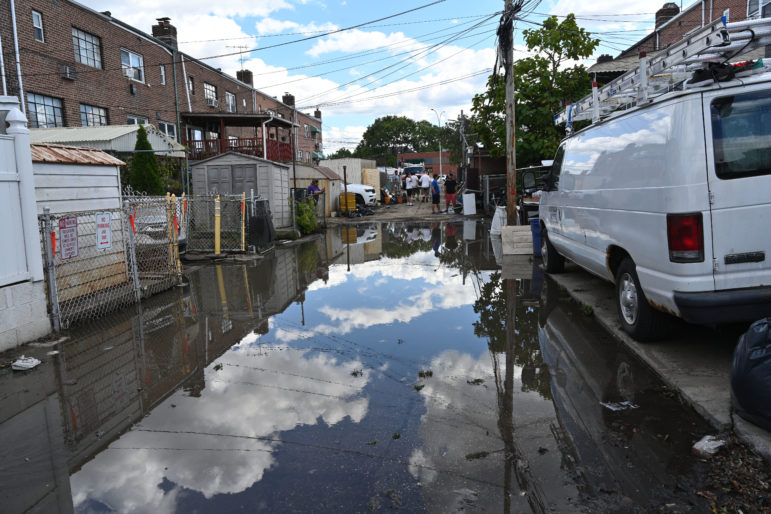In 2021 alone, New Yorkers purchased 7,645 homes with prior flood damages that totaled more than $23.5 million. The state’s current flood disclosure law contains a loophole that “stacks the deck against buyers,” a new report from the Natural Resources Defense Council found.

Kevin P. Coughlin / Office of the Governor
Flooding in Queens following Hurricane Ida.Thousands of New York homes with a history of flooding have resold—and may cost their new homeowners tens of thousands of dollars in future damages, according to a study released Tuesday.
In 2021 alone, New Yorkers purchased 7,645 homes with prior flood damages that totaled more than $23.5 million, the report showed. The research was commissioned by the Natural Resources Defense Council and conducted by consulting firm Milliman.
Local and state New York laws do not mandate that sellers disclose flood history or risk to buyers. In fact, New York’s Property Condition Disclosure Act offers a loophole for sellers to pay a credit of $500 to a buyer in lieu of releasing certain details about the property’s history.
For homeowners, the cost related to flooding can be much more significant. In New York state, where the average home has an annual expected loss of $104, previously flooded homes had 30 times that amount, the authors found.
“The purpose of the report is really just to draw attention to just how unsafe and just unfair it is to keep home buyers in the dark about flood damages due to poor disclosure laws,” said Joel Scata, an attorney with NRDC.
The organization has analyzed flood disclosure laws across the country and found the strongest are in the southern states of Texas, Louisiana, Oklahoma and Mississippi, all of which received “A” grades for their oversight of flood history disclosures. Comparatively, New York received an F.
“New York’s disclosure law stacks the deck against buyers when it come[s] to learning about a property’s flood risks or past flood damages,” the explanation of the rating says.
While New York’s disclosure laws are weak when it comes to flooding, it’s one of only four states that has laws requiring sellers to report hauntings or paranormal activity, according to Zillow.
In June, New York State legislators passed a measure modifying the real property law so that landlords are required to disclose flood history and risk to potential tenants. They now must include in leases if a property is located in a Federal Emergency Management Agency (FEMA) floodplain or has experienced flooding previously, as well as a notice that flood insurance is not included in a renter’s insurance policy.
The measure, which was approved by the State Assembly on the last day of the legislative session, is awaiting Gov. Kathy Hochul’s signature.
But no such measures are in sight for home sales. In October, City Limits reported on the challenges potential buyers and tenants have in learning about a property’s flood history absent a comprehensive official database. Experts suggested piecemeal tactics, such as researching potentially water-related violations like mold, leaks and peeling paint, but noted the limitations of such a method, which depend on prior tenants reporting those conditions.
The tech company ClimateCheck offers a free report on a given address, showing its risk of floods and extreme precipitation along with other climate-related risks, like drought and heat, but uses only regional data so may not capture a comprehensive history of flooding.
As the effects of climate change progress, the price for homeowners is likely to increase. The average flood cost in New York for homeowners over the span of a 30-year mortgage would be over $93,000—if measures are taken to limit global warming to no more than 1.5 degrees Celsius over pre-industrial levels. In a scenario without such aggressive decarbonization efforts, the state’s homeowners could see their mortgage increase by $188,683 over those three decades, the report estimated.
“Buying a previously flooded home, especially in the age of climate change, can be very risky for a home buyer,” said Scata. “And that’s why it’s really important that they have as much information as possible for them to make an informed decision.”
Liz Donovan is a Report for America corps member.









